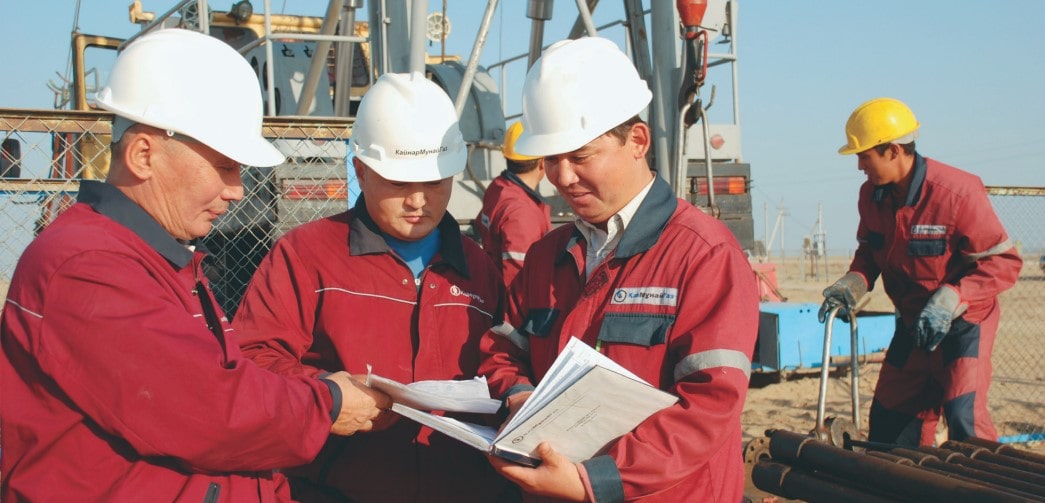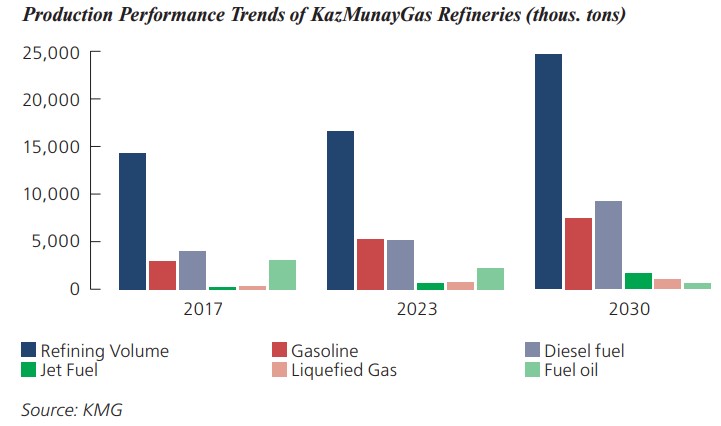Results of the Year
KazMunayGas Refining: Expanding Everywhere Expansion Is Possible

Mariyam Igisenova, Head of the Automation, Planning, and Operational Control Department at KazMunayGas, discusses the current state and new projects in the oil refining sector.
– Mariyam Zhumabayevna, how would you describe the current state of Kazakhstan's oil refining industry?
– As you know, KazMunayGas operates three oil refineries and one bitumen production plant. In the west, we have the oldest and simultaneously the most technologically advanced refinery in terms of the Nelson Complexity Index—Atyrau Refinery.
Between 2011 and 2018, it underwent significant modernization—a new facility was essentially built alongside the old one. The equipment of the original plant dates back to 1945, while the new facility was commissioned in 2018. Both the old and new units operate in tandem, with mature primary oil refining units working alongside modern hydrotreating, catalytic reforming, and aromatics production units. According to our analysis, the new facility is highly advanced and complex, boasting a Nelson Index of 13.6—one of the highest in the Eurasian region.
In the north, the Pavlodar Petrochemical Plant has been operating at full capacity in recent years. Market demand for gasoline, diesel, jet fuel, and liquefied gas continues to grow steadily annually, forcing all our refineries to operate at maximum capacity.
For example, while Atyrau Refinery’s capacity is 5.5 mln tons, we are refining even more this year. Pavlodar's balanced capacity is also 5.5 mln tons, and we are also reaching that level this year. This refinery has a more modest Nelson Index of around 10.5 but excels in refining depth at 91%, which will increase further.
In the south, Shymkent Refinery is the newest and the most powerful, with a capacity of 6 mln tons. Its capacity was expanded during the modernization period of 2014–2018, which also increased refining depth and diversified its product range. The Nelson Index here is 8, and the refining depth is 85%.
Regarding the types of crude oil processed, Atyrau primarily handles western Kazakhstan crude, mainly Mangystau crudes; Pavlodar processes oil of a different quality; and Shymkent mostly processes Aktobe and Kumkol crudes. These crudes come from mature fields with good potential for producing light petroleum products. We fully utilize this potential at our refineries to maximize the output of light products.
There is also a fourth plant—Caspi Bitum in Aktau—which specializes in bitumen production. It has a capacity of 1 mln tons of oil annually and processes heavy Buzachi crude.

– One of the declared goals of the refinery modernization was to improve the environmental quality of fuels. Could you elaborate on this?
– Indeed, the refinery modernization aimed to enhance the quality of motor fuels to K-4 and K-5 classes (equivalent to Euro-4 and Euro-5 under the Customs Union's technical regulations). Following the modernization, overall production at all three refineries nearly tripled. At the same time, modern environmental protection measures limited emissions increases to just 1.7 times at Atyrau Refinery, 1.4 times at PKOP (Shymkent Refinery), and no change at Pavlodar Refinery.
At the same time, harmful substances in motor fuels—major contributors to anthropogenic impacts on human health from vehicle exhaust—were significantly reduced:
- Sulfur content decreased tenfold (a source of sulfur oxides).
- Benzene content decreased fivefold (a source of benzopyrene, a class 1 carcinogen).
- Aromatic hydrocarbons decreased by 1.5 times (a source of soot formation).
Our refineries are currently undergoing procedures to obtain integrated environmental permits per the Environmental Code of Kazakhstan.
As part of our contribution to the green agenda, we should also mention the TAZALYQ project, under which the reclamation of the first and second sectors of the Atyrau Refinery’s evaporation fields was completed in 2023. The reclamation of the third and fourth sectors is expected to be completed by 2025.

– What were the results for 2023, and what are your expectations for the current year?
– The year 2023 was record-breaking for oil refining volumes in Kazakhstan’s history. This year, we plan to exceed that milestone.



